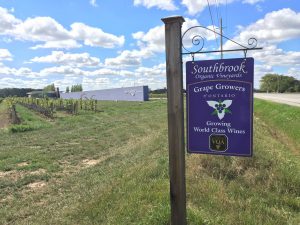 Living in harmony with the land is a cornerstone of the philosophy at Southbrook Vineyards in Niagara-on-the-Lake.
Living in harmony with the land is a cornerstone of the philosophy at Southbrook Vineyards in Niagara-on-the-Lake.
For owners Bill and Marilyn Redelmeier, it’s a love story with wine, the land, and all things local — and sharing this passion with other wine-lovers.
Their 150-acre vineyard is widely celebrated for its organic and biodynamic wines.
In 2008, Southbrook Vineyards was the first wine estate in Canada to earn both organic and biodynamic certification (the establishment period began in 2006).
“You could think of biodynamic as a more extreme form of organic agriculture,” shares Ann Sperling, Director of Winemaking and Viticulture at Southbrook. “We also work with certified organic grape growers in the region, in addition to what we produce on our own vineyard.”
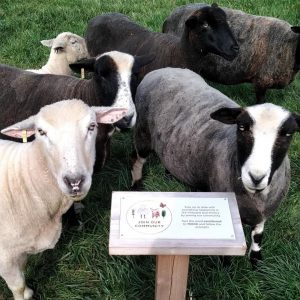 Sheep in particular have been an integral part of the winery since Southbrook’s move from Maple to Niagara.
Sheep in particular have been an integral part of the winery since Southbrook’s move from Maple to Niagara.
“Not only are they a part of our biodiversity, they also align within our biodynamic principals,” one of their Instagram posts shares. “Our sheep act as free lawnmowers, weed whackers, and also help with soil fertility.”
“Ruminants are essential for biodynamic farming,” Ann explains. “And all of the animals (sheep, chickens, and cattle) are part of the energy of the vineyard/farm. Organic soils built on a foundation of organic matter stabilize the nutritional cycles of plants while sequestering carbon – holding it in the earth and preventing it from being released into the atmosphere.”
Linc Farm, on Southbrook land but operated independently by Juliet Orazietti and her husband Martin Weber, manage the livestock essential to Southbrook winery. The two met while completing their Masters Degrees in Austria—Juliet has a Masters in Animal Breeding and Genetics, and Martin in Animal Husbandry—and both share Southbrook’s vision for living in harmony with the land.
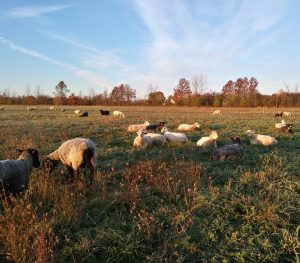 “By looking at the whole farm system,” Juliet shares, “we’re able to support a healthy population of food producing animals, but also everything that feeds into the system such as the native plants, insects, birds and animals that live alongside them, not to mention a robust soil system.”
“By looking at the whole farm system,” Juliet shares, “we’re able to support a healthy population of food producing animals, but also everything that feeds into the system such as the native plants, insects, birds and animals that live alongside them, not to mention a robust soil system.”
You will find sheep, pigs, chickens and cattle on Linc Farm. In their rotational grazing system, the sheep graze the pasture first, followed by the chickens, and then about 5 cows graze after the regrowth from the chickens — it’s all part of a larger, harmonized cycle.
“Working in a closed loop system is a big part of biodynamics,” Ann explains.
“We raise or grow as many inputs as possible within our own farm environment. We also work with biodynamic preparations which are compost preparations, to enliven and enrich the soil environment, to mobilize minerals, and to bring what the vines need out of the soil and out of the environment. Rather than relying on outside inputs, we’re trying to work within our own environment to create a balanced vineyard.”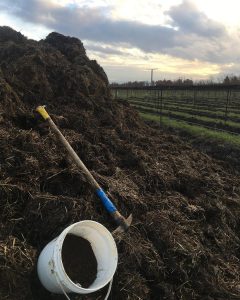
These inventive approaches are why Linc Farm was featured on the Small Plot Agriculture Workshop and Tour hosted in Niagara and sponsored by the Friends of the Greenbelt and the Golden Horseshoe Food and Farming Alliance.
Ann, who has been making wine since the mid ’80s and working with organic viticulture since about ’98, is responsible for overseeing all of the production at Southbrook, including the farm, vineyard and wines.
“We started out with wine quality as our most important objective, but there is also the social responsibility aspect. We must also consider the health of all of the visitors and employees that visit or work in the vineyard daily in the growing season,” Ann says.
“Organic agriculture is good for sequestering carbon too, so being a solution to greenhouse gas problems and climate change was all part of what we considered as a responsible approach to the long-term nature of what a winery and vineyard means to a region.”
Since Southbrook received the first biodynamic certification in Canada in 2008, there are now others that have followed suit.
In fact, Southbrook has taken a leadership role by mentoring, educating and sharing organic and biodynamic methods in the wine community.
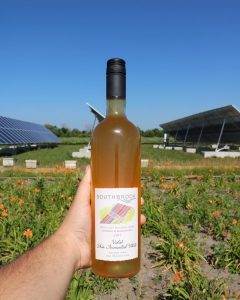 Specifically within the Niagara Region, Tawse Winery in Vineland and Hidden Bench Estate Winery in Beamsville now use biodynamic methods. Outside of the province, there are biodynamic-run wineries in Nova Scotia, Quebec and British Columbia.
Specifically within the Niagara Region, Tawse Winery in Vineland and Hidden Bench Estate Winery in Beamsville now use biodynamic methods. Outside of the province, there are biodynamic-run wineries in Nova Scotia, Quebec and British Columbia.
“There’s a small group working bio-dynamically in Canadian vineyards, but it definitely is growing as more see the value in these processes,” Ann shares.
To learn more about Southbrook’s vision or their wines—which also carry the VQA label and contain 100% Ontario grapes—check out their website: https://www.southbrook.com/
